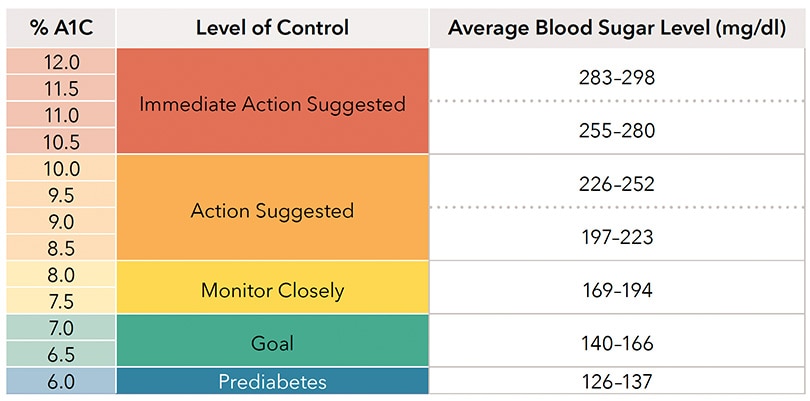Your blood sugar is important, but these aren’t the only important numbers that can help you. Your blood pressure and cholesterol numbers are also very helpful to know.
Being aware of these numbers can help you make choices without worry. They can give you confidence to learn from your actions, and motivation to keep up with what’s working well.
ABCS of diabetes
Numbers listed here and in other sources of health information are averages. Talk to your doctor about your personal goal numbers, as they may be different.
'A' is for the A1C ("A-one-C") test
High blood sugar levels can harm your heart, blood vessels, kidneys, feet, and eyes. For most people, the A1C goal is less than 7%.
'B' is for blood pressure
High blood pressure can cause a heart attack, stroke, or kidney disease. Aim for blood pressure below 140/90 (140 over 90).
'C' is for cholesterol
LDL is the “bad” cholesterol. It can clog your blood vessels and cause a heart attack or stroke. Aim for LDL below 100 mg/dl.
You may be able to lower your risk of heart attack and stroke with cholesterol-lowering medication. It may help even if your actual cholesterol level is normal. If you're ready to improve your heart health by making a few lifestyle changes, join the Taking Care of Your Heart workshop. Visit our Center for Healthy Living for more information.
'S' is for stop smoking
Smoking tobacco increases your risk for cancer, diabetes, and heart failure.
Increase your chances of quitting by calling Wellness Coaching by Phone at 1-866-862-4295 (TTY: 711) or attending our Freedom from Tobacco workshop. Visit our Center for Healthy Living for more information.
What’s the difference between glucometer readings and the A1C test?
The A1C test is a lab test ordered by your doctor. It shows what your average blood sugar numbers have been over the past 2 to 3 months. The results can help you decide whether you need to make any changes.
Your glucometer (glucose meter) will show how much glucose is in your blood at the time you check it. The results will help you and your doctor plan any needed changes in your diet, exercise, stress levels, or medications.

